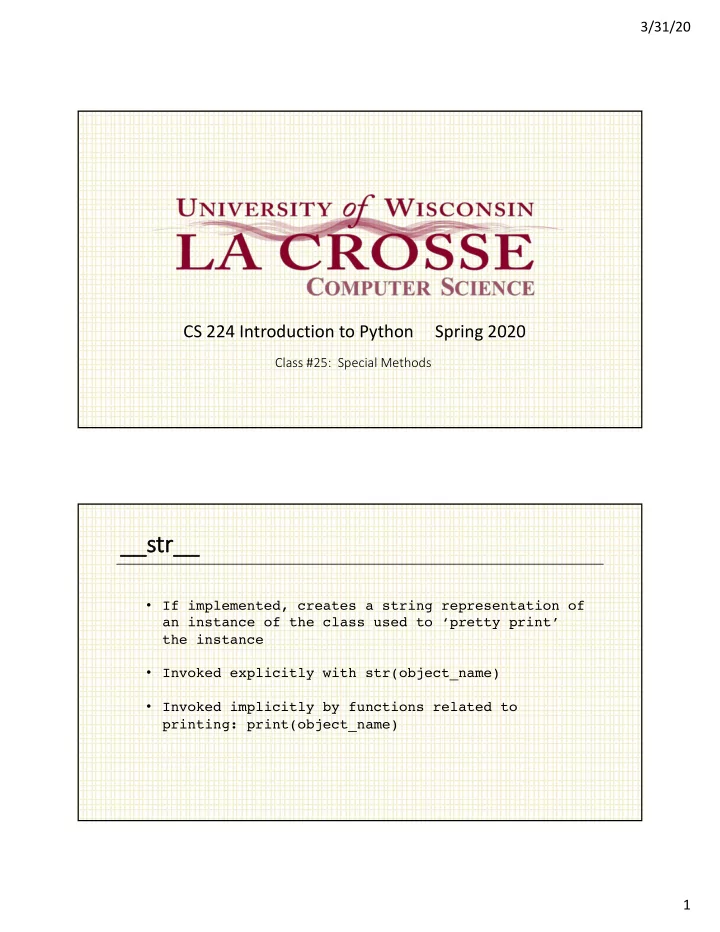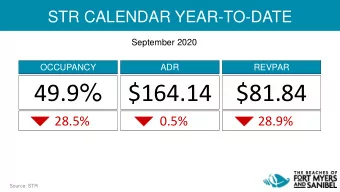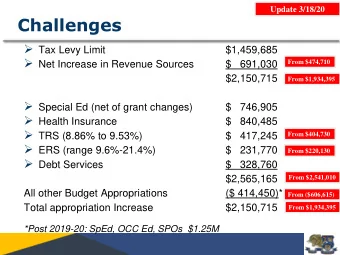
__ __st str__ __ If implemented, creates a string representation - PDF document
3/31/20 CS 224 Introduction to Python Spring 2020 Class #25: Special Methods __ __st str__ __ If implemented, creates a string representation of an instance of the class used to pretty print the instance Invoked explicitly
3/31/20 CS 224 Introduction to Python Spring 2020 Class #25: Special Methods __ __st str__ __ • If implemented, creates a string representation of an instance of the class used to ‘pretty print’ the instance • Invoked explicitly with str(object_name) • Invoked implicitly by functions related to printing: print(object_name) 1
3/31/20 Ex Exampl ple class Account(object): def __init__(self, name, balance): self.name = name self.balance = balance def __str__(self): s = ‘Account holder: ‘ + self.name + ‘\n’ s += ‘Balance: ‘ + str(self.balance) s += ‘\n’ return s checking = Account(‘David’, 100000) print(checking) __ __re repr__ __ • If implemented, creates a simple string representation of an instance that can be evaluated to recreate the instance • Invoked explicitly with repr(object_name) • If not implemented, a string of this form is returned: <account.Account instance at 0x[hex address]> 2
3/31/20 Ex Exampl ple class Account(object): def __init__(self, name, balance): self.name = name self.balance = balance def __repr__(self): return ‘Account({}, {})’.format(self.name, self.balance) checking = Account(‘David’, 100000) repr(checking) new_checking = eval(repr(checking)) Comp Compari rison ons • Python supports a number of methods that, if implemented, compare instances of a class. • __lt__, __gt__, __le__, __ge__, __eq__, __ne__ • As the implementer, you get to decide what each of these mean with respect to instances of your class. 3
3/31/20 Ex Exampl ple class Account(object): def __init__(self, name, balance): self.name = name self.balance = balance def __lt__(self, other): if self.balance < other.balance: return True elif self.balance == other.balance and self.name.lower() < other.name.lower(): return True return False Ex Exampl ple checking1 = Account(‘Alice’, 10000) checking2 = Account(‘Bob’, 5000) if checking1 < checking2: print(‘checking1’) what is printed? else: print(‘checking2’) 4
3/31/20 Ex Exampl ple checking1 = Account(‘Alice’, 10000) checking2 = Account(‘Bob’, 5000) if checking1 < checking2: print(checking1) what is printed? else: print(checking2) In this version, there are no ‘’ in the print statements. So __str__ is invoked (if implemented) and used to print the appropriate Account object Ex Exampl ple class Account(object): def __init__(self, name, balance): self.name = name self.balance = balance def __eq__(self, other): if self.balance == other.balance and self.name == other.name: return True return False 5
3/31/20 Ma Math O Operation ons • Python supports a number of methods that, if implemented, perform math operations on instances of a class. • __add__, __sub__, __mul__, __div__, __mod__, __iadd__, __isub__, __abs__, __int__ (and more) • Some (or all) of these won’t make sense for some classes. Ma Math O Operation ons • __add__, __sub__, __mul__, __div__, __mod__, etc override +, -, *, /, % • They must return the return the result of the operation • __iadd__, __isub__, __imul__, __idiv__, __imod__, etc override +=, -=, *=, /=, %= • They must return self when complete 6
3/31/20 Ex Exampl ple class Account(object): def __init__(self, name, balance): self.name = name self.balance = balance def __add__(self, other): return self.balance + other.balance def __mul__(self, other): return self.balance * other.balance Exampl Ex ple class Account(object): def __init__(self, name, balance): self.name = name self.balance = balance def __iadd__(self, other): self.balance += other.balance return self def __imul__(self, other): self.balance *= other.balance return self 7
3/31/20 Ca Callable Interf rface • Implementing __call__ allows an object to be used like a function. This is also known as a functor. One advantage is that a functor contains state (stored in the attributes). This state can be used to affect what the functor does. • Why? It can be useful but really, it’s just cool. Ex Exampl ple class Account(object): def __init__(self, name, balance): self.name = name self.balance = balance def __call__(self, n): self.balance += n 8
3/31/20 An Another Example class Multiplier(object): def __init__(self, factor): self.factor = factor def __call__(self, n): return n * factor Rate3 = Multiplier(3) Rate5 = Multiplier(5) fives = map(Rate5, [randint(1, 20) for _ in range(10)] __d __del__ __ • __del__ is called automatically (if it exists) when an object is being destroyed • Only implement this if there is some resource cleanup needed: • release locks • close a connection • update class instance variables 9
3/31/20 __b __bool__ __ • __bool__ is called automatically when a truth- value test is performed on an object • if it is not implemented, __len__ is used instead Exampl Ex ple class Account(object): def __init__(self, name, balance): self.name = name self.balance = balance def __bool__(self, n): return len(self.name) > 0 10
3/31/20 Ex Exampl ple class Account(object): def __init__(self, name, balance): self.name = name self.balance = balance def __bool__(self, n): return self.balance >= 0 11
Recommend
More recommend
Explore More Topics
Stay informed with curated content and fresh updates.























